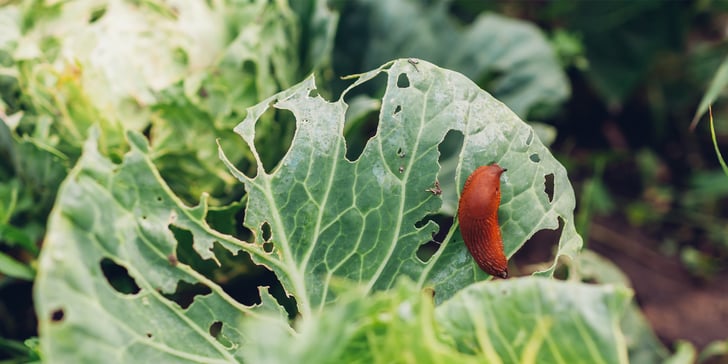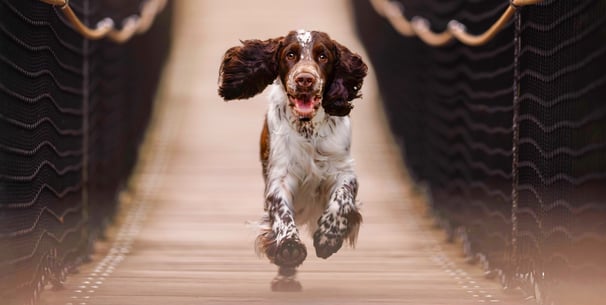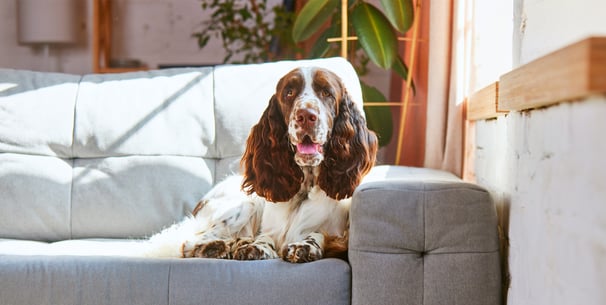Are Slugs Poisonous to Dogs? - Dangers in the Garden
Index:



Introduction
Slugs may not be directly poisonous to dogs, but they pose a significant threat to canine health due to their role as carriers of lungworm. Understanding the dangers that slugs present in the garden is crucial for dog owners to protect their furry companions.
Key takeaways:
Slugs are not directly poisonous to dogs, but they can transmit lungworm.
Lungworm is a parasitic worm that affects dogs and foxes.
Slugs and snails act as common carriers of lungworm.Recognising the signs of lungworm infection is important for early treatment.
Proactive prevention measures, such as parasite prevention treatments, can help protect dogs from lungworm.
Understanding the threat: lungworm in dogs



Lungworm, scientifically known as Angiostrongylus vasorum, is a parasitic worm that affects dogs and foxes. This section aims to provide a comprehensive understanding of lungworm, including its definition, life cycle, and the role played by slugs and snails as common carriers.
For comprehensive care, consider learning more about dog health including conditions like rapid breathing.
The life cycle of lungworm
The life cycle of lungworm involves various stages, beginning with the adult worm residing in the blood vessels of the host's lungs. These worms produce eggs, which are then released into the host's lungs and coughed up.
The eggs are then swallowed, pass through the digestive system, and are expelled through faeces.
Once in the environment, the eggs develop into larvae, which are often consumed by slugs and snails.
These infected slugs and snails are then ingested by dogs during activities such as eating grass, drinking from contaminated water sources, or playing with toys contaminated with slug or snail slime.
Once inside the dog's digestive system, the lungworm larvae migrate through the body and settle in the host's heart and lungs, where they mature into adult worms and perpetuate the life cycle.
Common carriers: infected slugs and snails
Slugs and snails act as common carriers of lungworm. When dogs come into contact with the slime or ingest infected slugs and snails, they become vulnerable to contracting lungworm.
Therefore, it is important to be aware of the potential risks posed by these garden dwellers and to learn how to bathe a dog properly to remove any traces of these pests.
Facts about lungworm
Scientific name: Angiostrongylus vasorum
Hosts: dogs, foxes
Infection route: ingestion of infected slugs or snails
Life cycle: eggs are released in the lung, passed through faeces, develop into larvae in the environment, slugs and snails consume larvae, dogs ingest infected slugs or snails, larvae migrate to heart and lungs.
Understanding the threat that lungworm poses to dogs is essential for dog owners to take necessary precautions in order to prevent their pets from contracting this potentially dangerous parasite.
Are slugs poisonous to dogs?



While slugs themselves are not directly poisonous to dogs, they carry the risk of transmitting lungworm. Ingesting slugs can be dangerous for dogs, especially if the slugs are infected with lungworm larvae.
Lungworm is a parasitic worm that can cause severe health issues in dogs, affecting the heart, lungs, and other organs. Slugs act as common carriers of lungworm, and when dogs consume them, they become vulnerable to infection.
It's essential for dog owners to be aware of the risks associated with dogs ingesting slugs and take necessary precautions to protect their pets.
Preventing access to areas where slugs are present, removing slugs from the surroundings, and using appropriate preventative measures can greatly reduce the chances of dogs contracting lungworm.
It's also essential to be aware of what dogs can safely eat, such as understanding whether dogs can eat cucumbers, as part of maintaining their health as well as understanding the peace of mind which comes with pet insurance.
Recognising infection: key clinical signs of lungworm



Recognising the signs of lungworm in dogs is essential for early detection and prompt treatment. By understanding the clinical signs and symptoms, pet owners can take the necessary steps to ensure their dog's well-being and seek veterinary advice when needed.
Signs of lungworm infection
Lungworm infection symptoms may vary in dogs, but there are some common signs to look out for. These include:
Coughing, particularly if it is persistent or worsens over time.
Difficulty breathing or rapid breathing.
Reluctance to exercise or tiring easily.
Unexplained weight loss.
Decreased appetite or changes in eating habits.
Lethargy or general weakness.
Vomiting, diarrhoea, or other gastrointestinal issues.
If your dog displays any of these symptoms, it is important to consider the possibility of a lungworm infection and seek veterinary advice for proper diagnosis and treatment.
Behavioural changes and physical symptoms
In addition to the clinical signs mentioned above, lungworm infection can also manifest through behavioural changes and physical symptoms. These can include:
Restlessness or pacing.
Changes in behaviour, such as aggression or unusual anxiety.
Seizures or neurological abnormalities.
Bleeding disorders, such as nosebleeds or blood in the urine or faeces.
Unexplained or excessive bruising
It is important to note that these behavioural changes and physical symptoms may vary from dog to dog, and not all dogs will exhibit the same signs.
Therefore, it is crucial to be vigilant and consult a veterinarian if you notice any unusual changes in your dog's behaviour or physical well-being.
When to seek veterinary advice
If you observe any of the clinical signs, behavioural changes, or physical symptoms mentioned above, it is recommended to consult a vet for lungworm. Early detection and prompt treatment are vital in managing lungworm infections and preventing further complications.
Your veterinarian will be able to conduct the necessary tests and provide appropriate treatment options to address the infection and ensure your dog's health and well-being.
Prevention and protective measures



Taking proactive measures to prevent lungworm in dogs is essential. By implementing effective prevention treatments and limiting your canine companion's exposure to dangers, you can significantly reduce the risk of lungworm infection.
Effective parasite prevention treatments
There are several highly effective parasite prevention treatments available to safeguard your dog against lungworm. Consult with your veterinarian to determine which treatment option is most suitable for your dog's specific needs and lifestyle. Some common prevention treatments include:
Monthly oral medications - These medications are easy to administer and provide continuous protection against lungworm.
Topical spot-on treatments - Applied directly to your dog's skin, these treatments provide long-lasting protection.
Preventive collars - These collars release active ingredients that repel and kill parasites, including lungworm.
Remember to follow the instructions provided by the manufacturer and your veterinarian when administering these prevention treatments.
Limiting your canine companion's exposure to dangers
In addition to using effective prevention treatments, it is crucial to limit your dog's exposure to lungworm risks. Here are some practical tips to help protect your furry friend:
Keep your garden clean and free from areas where slugs and snails may congregate.
Regularly inspect outdoor areas, such as patios and play areas, for signs of slugs or snails.
Avoid leaving water bowls or food outside, as they may attract slugs and snails.
Consider using slug and snail barriers, such as copper tape or crushed eggshells, to discourage them from entering your garden.
Supervise your dog during outdoor activities and discourage them from investigating or consuming slugs or snails.
Regularly clean and disinfect your dog's toys, bedding, and living area to minimise the risk of exposure to lungworm larvae.
By implementing these protective measures and maintaining a vigilant approach, you can significantly reduce the risk of your dog contracting lungworm and ensure their continued well-being.
Garden hazards: assessing and reducing risks



Creating a safe and dog-friendly garden involves assessing and reducing the various hazards that can pose a threat to your canine companion's health. By implementing proper precautions and following dog-friendly garden practices, you can ensure a secure and enjoyable outdoor space for both you and your dog.
Here are some common garden hazards for dogs and guidelines on how to minimise the risks:
Plants toxic to dogs: certain plants, such as lilies, azaleas, and daffodils, can be toxic to dogs if ingested. Remove these plants from your garden or keep them out of your dog's reach. Check online resources or consult a veterinarian to identify other toxic plants.
Chemicals and pesticides: avoid using chemical-based pesticides, herbicides, and fertilisers that can be harmful to dogs. Opt for organic and pet-safe alternatives. When applying any substances, ensure your dog is kept away from the treated area until it is safe.
Sharp objects and tools: securely store gardening tools, sharp objects, and equipment to prevent accidental injuries to your dog. Keep the garden area clear of any debris, broken glass, or sharp rocks.
Garden machinery: dogs may be curious about or frightened by garden machinery, such as lawnmowers and trimmers. Keep your dog indoors or in a safe area when operating such machinery to prevent accidents or injuries.
Water hazards: ensure that any ponds, pools, or water features in your garden are safely fenced or covered to prevent accidental drowning. Keep an eye on your dog when they are near water to ensure their safety.
Insect and pest control: be cautious with insecticides and pest control products used in your garden. Some products can be toxic to dogs if ingested. Choose pet-friendly options or consult a veterinarian for advice on controlling pests without endangering your dog's health.
Fencing and boundaries: make sure your garden is securely fenced to prevent your dog from escaping and encountering potential hazards outside. Regularly inspect the fence for any gaps, broken panels, or weak areas.
By becoming aware of the hazards present in your garden and taking appropriate measures to reduce risks, you can create a safe and dog-friendly environment for your beloved furry friend.
Remember, the well-being of your dog is in your hands, so take the necessary precautions to keep them happy and healthy.
Conclusion



In conclusion, prompt treatment for lungworm is vital to ensure the well-being of dogs. Lungworm, carried by slugs and snails, poses a significant threat to canine health. Therefore, immediate veterinary care is essential in diagnosing and treating this parasitic infection.
Additionally, understanding healthy options for your pet such as grain-free dog food can contribute to overall canine health and for further pet care insights, exploring topics like dog accessories can enhance your approach to pet ownership.
The importance of prompt treatment
The prompt treatment of lungworm is of utmost importance due to the potential complications it can cause in dogs. If left untreated, lungworm infection can lead to severe respiratory distress, bleeding disorders, and even death. Identifying the clinical signs early on and seeking veterinary advice promptly can significantly increase the chances of a positive outcome for your furry companion.
FAQs
Are slugs poisonous to dogs?
Slugs themselves are not directly poisonous to dogs. However, they pose a significant threat to canine health as carriers of lungworm. Understanding the dangers that slugs present in the garden is crucial for dog owners to protect their furry companions.
What is lungworm?
Lungworm, scientifically known as Angiostrongylus vasorum, is a parasitic worm that affects dogs and foxes. It can cause major damage to the lungs and blood vessels, and if left untreated, can be a fatal disease for dogs. It is important to be aware of the signs of lungworm and seek prompt treatment if necessary.
How do slugs and snails act as common carriers of lungworm?
Slugs and snails become infected with lungworm larvae by ingesting infected faeces, which contain the lungworm eggs. Once the larvae develop in the slug or snail, they can be transmitted to dogs when they come into contact with the slug or snail, such as by eating them or drinking water from a contaminated bowl.
What are the signs of lungworm infection in dogs?
The signs of lungworm infection in dogs can vary, but common symptoms include persistent coughing, difficulty breathing, weight loss, loss of appetite, vomiting, diarrhoea, and excessive bleeding or bruising. If you notice any of these signs in your dog, it is important to seek veterinary advice as soon as possible.
How can I prevent lungworm in my dog?
There are various preventative treatments available for lungworm in dogs, including antiparasitic medications prescribed by your veterinarian.
Additionally, limiting your dog's exposure to slugs and other sources of infection, maintaining a clean environment, and avoiding contact with infected slugs or snails can help reduce the risk of lungworm.
What are the common garden hazards that pose a threat to dogs?
In addition to slugs, there are other common garden hazards that can pose a threat to dogs, including toxic plants, garden chemicals, sharp objects, and garden tools. It is important to assess and reduce these risks in your garden to create a safe environment for your canine companion.
Why is prompt treatment for lungworm important?
Prompt treatment for lungworm is crucial to ensure the well-being of dogs. If left untreated, lungworm can cause permanent damage to the lungs and major blood vessels, and in severe cases, it can be fatal. It is important to seek veterinary care if you suspect your dog may be infected with lungworm.
What is the role of pet owners in preventing lungworm?
Pet owners play a vital role in preventing lungworm by being aware of the risks and taking proactive measures to protect their dogs. This includes regular veterinary visits, following preventative treatment protocols, and minimizing contact with slugs, snails, and other potential sources of infection.
Waggel Pet Insurance
Need more help? You're in luck if you're a Waggel Pet Insurance member. Along with our excellent coverage, we offer access to a 24/7 online vet to answer all your sticky questions, especially if you need grooming assistance.
Not a member? Why not get a quote now and cover your furry friend for a range of illnesses, all while enjoying our amazing perks and rewards.
Want more like this?
Get updates from us with helpful info, advice, answers to frequently asked questions and much more.
Index:
Related posts:
Get your quote
Along with our excellent coverage, we offer access to a 24/7 online vet to answer all your sticky questions.





